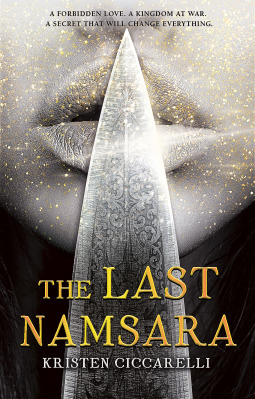
Synopsis:
In the beginning, there was the Namsara: the child of sky and spirit, who carried love and laughter wherever he went. But where there is light, there must be darkness—and so there was also the Iskari. The child of blood and moonlight. The destroyer. The death-bringer.
These are the legends that Asha, daughter of the king of Firgaard, has grown up learning in hushed whispers, drawn to the forbidden figures of the past. But it isn’t until she becomes the fiercest, most feared dragon slayer in the land that she takes on the role of the next Iskari—a lonely destiny that leaves her feeling more like a weapon than a girl.
Asha conquers each dragon and brings its head to the king, but no kill can free her from the shackles that await at home: her betrothal to the cruel commandant, a man who holds the truth about her nature in his palm. When she’s offered the chance to gain her freedom in exchange for the life of the most powerful dragon in Firgaard, she finds that there may be more truth to the ancient stories than she ever could have expected. With the help of a secret friend—a slave boy from her betrothed’s household—Asha must shed the layers of her Iskari bondage and open her heart to love, light, and a truth that has been kept from her.
Rating: 🌟🌟🌟🌟
I was wary going into this book. Despite dragons being the first thing many of us think of when we hear "fantasy," most dragon books just aren't that great. But this is a great dragon book, and I really enjoyed it.
A lot of strong YA heroines are really hit or miss, and often feel like the same formulaic badass girl copy and pasted over and over again. Not so with Asha. She was complicated and conflicted, strong and scarred. I thought Kristen Ciccarelli did a great job at showing the royal arrogance ingrained naturally in Asha by her upbringing, without making said arrogance insufferable. Asha would walk away from conversations without any social grace. She didn't linger on the lives of those below her. And so seeing Asha's transformation over the course of the novel was all the more satisfying as she changed these behaviors.
I especially loved the writing in this novel. It's not exactly the sort of complex prose I salivate over, but Ciccarelli is fantastic at creating tension and making her sentences sting. She captured brutality and weakness wonderfully, and had me on the edge of my seat during exchanges with Jarek, Asha's betrothed and a true villain in the novel.
Also, can we talk about Torwin? I LOVED him. I LOVED his relationship with Asha. I LOVED how Asha's physical prowess and strength out-shined his own, but his cleverness made Asha stop up short. The hyper-masculine, over-protective love interest YA adores? NOPE. These two turned that problematic trope on it's head and oh my god I'm living for it.
One problem I did have with the novel, however, is that I'm 95% sure all of the characters are supposed to be poc, yet their skin tones are never. ever. mentioned. Why? They live in a desert kingdom. They all have dark hair and dark eyes. Why can't we ever get a dark skin, brown skin, HEY WE'RE NOT WHITE mention ever?? I'd even take a "tan" mention. It just seems cowardly to me to leave it vague enough that readers could imagine the cast as all white, yet drop enough poc hints that if someone calls Ciccarelli on it, she could still be like "ACTUALLY if you look here, here, and here..." I don't like that.
I'm also lowkey a lil salty that each book in this trilogy will be a stand-alone, because I really thought this book was setting me up for an Asha trilogy. But I will read the next book, even if I miss Asha.

No comments:
Post a Comment